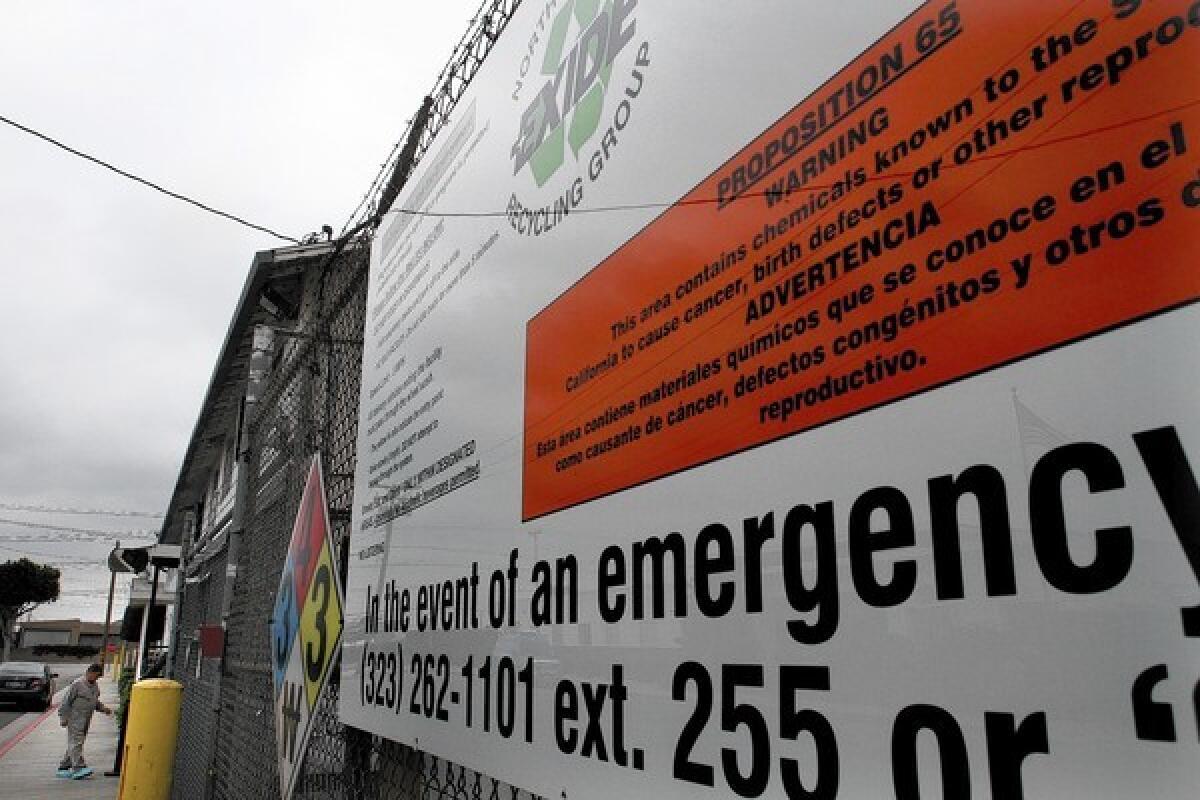Residents urge closure of Exide battery recycling plant

- Share via
One by one, hour after hour Saturday in a ballroom at Cal State Los Angeles, residents, elected officials and activists from southeast Los Angeles pleaded with an air district hearing board to shut down a Vernon battery recycler accused of endangering hundreds of thousands of people because of unsafe arsenic and lead emissions.
“I’m a mother, asking you, please, do something,” said Sandra Martinez. “I go days without sleeping, worrying about my child dying in his sleep from asthma.”
But company officials and workers from Exide Technologies, one of the world’s largest recyclers of lead acid batteries, made a passionate case of their own that the plant’s emissions no longer pose a health risk, and that the air district lacks the authority to force it to shut down or make certain other operating changes.
Exide employee Juan Felix said he has seen “vast improvements” to reduce emissions at the plant. “They do care about the community and they do care about the health and safety of employees,” he said. “Take the time to look at the facts.”
Saturday’s hearing was the first of several planned on a petition filed by the South Coast Air Quality Management District in October calling for a halt to lead smelting operations at Exide “until its air pollution control systems are improved and deemed adequate” to control toxic emissions.
A health risk assessment released earlier this year found that the plant was posing an elevated cancer risk to 110,000 people living from Boyle Heights to Huntington Park because of arsenic emissions. The plant, which opened in 1922 and was taken over by Exide in 2000, has also been cited several times in recent years, often for exceeding permissible levels of lead.
In April, the state department of Toxic Substances Control, which oversees the plant, moved to shut it down temporarily, citing health risks, but Exide appealed and a judge allowed the plant to resume operations.
Stymied, the state entered into an agreement with the company in which Exide agreed to spend $7.7 million for a new storm water system and improvements to reduce arsenic emissions. The company will also pay for voluntary blood tests for hundreds of thousands of people who might have been affected.
That did little to satisfy furious residents in southeast Los Angeles County, who have accused the company of poisoning their community and regulatory agencies of allowing it to happen.
In October, Assembly Speaker John A. Pérez (D-Los Angeles) and state Sens. Ricardo Lara (D-Bell Gardens) and Kevin de Le¿n (D-Los Angeles) confronted regulators in front of an angry crowd at Resurrection Church in Boyle Heights, demanding that officials do everything in their power to protect the public.
Ten days later, the air district, which regulates air emissions independently from the state toxics agency, issued its petition to shut down the plant.
Now, under air district rules, an independent, quasi-judicial panel will take testimony from both sides and from members of the public before ruling.
In her opening statement, Nancy Feldman, the air district’s lawyer, compared Exide’s pollution control system to a vacuum cleaner that spews dust and debris from the carpet “out of the sides before it ever reaches the filters in the vacuum” and “more distressing ...it actually spits dirt right out the front, back onto your carpet.”
“You better buy a better vacuum cleaner,” she said.
Exide’s lawyer, Stephen O’Neil, countered that Exide’s arsenic emissions have plummeted since the source tests on which the health risk assessment was based. He also charged that the air district, in response to political pressure, is trying to impose conditions that are not actually enshrined in law on the company.
“Truth No. 1: The Exide facility’s current emissions are not creating a health risk,” he said, adding that the hearing process should not be “a referendum on Exide’s popularity.”
Many who packed into the ballroom did not appear convinced.
Rep. Lucille Roybal-Allard (D-Downey), who represents many of the affected areas, called the company “one of the worst environmental polluters of lead and arsenic in California.”
“Without board action ... hundreds of thousands of local residents and their children will continue to be at risk of silently being poisoned by dangerous emissions,” she said.
Others made more personal pleas, telling of relatives who have died of cancer, or who suffer from asthma.
Some also complained that other, less harmful air pollution threats, such as a pungent chili smell from the Sriracha hot sauce factory in Irwindale and the fire rings in Newport Beach, have resulted in shutdown orders, while Exide has been allowed to continue to operate.
Responding to Exide’s complaint that the air district was acting under political pressure, Monsignor John Moretta of Resurrection Church said: “I’m not here because of any political pressure. I’m here because of a moral pressure.... Can you imagine how we felt, first lead and now arsenic?”
Proponents of keeping the plant open, meanwhile, repeatedly emphasized that emissions are way down; Exide has also submitted a detailed plan for further reduction to the air district.
Exide officials and workers warned that shutting the plant would eliminate well-paying manufacturing jobs and leave few options for safely recycling batteries. The Exide plant is one of just two west of the Rocky Mountains.
“We share the company’s commitment to health and safety and, on behalf of the 100 union workers and families from the communities surrounding the Vernon site, we ask our fellow Californians to support [keeping the plant open with new emission controls] to protect the environment and preserve these good jobs,” said David Campbell, secretary-treasurer of United Steel Workers Local 675, in a statement.
The next hearing on the Exide question will be Jan. 7 at air district headquarters in Diamond Bar.
More to Read
Sign up for Essential California
The most important California stories and recommendations in your inbox every morning.
You may occasionally receive promotional content from the Los Angeles Times.










